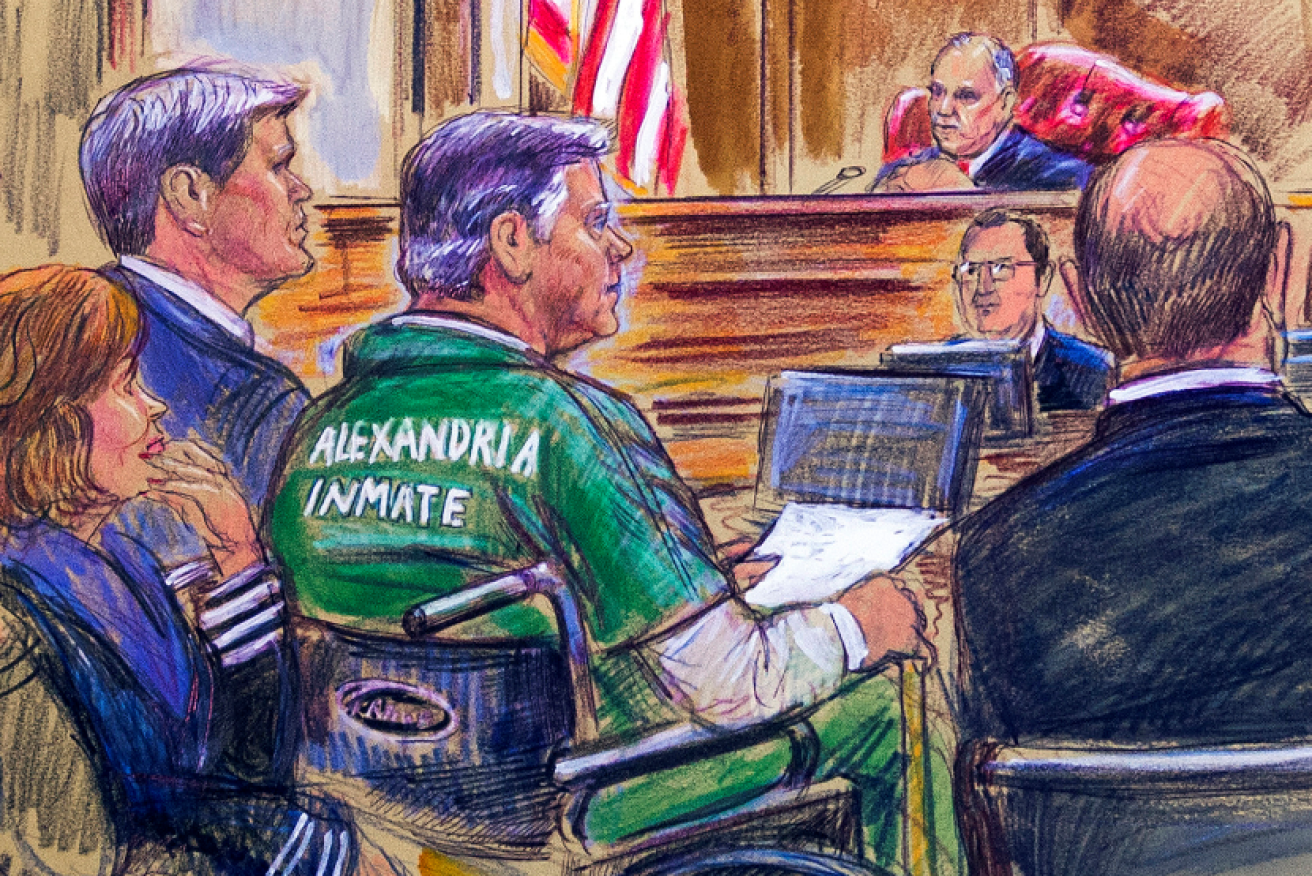Russiagate probers fume as Trump insider Paul Manafort gets ‘atrociously low’ sentence

Dressed in prison fatigues rather than his customary $5000 suits, a shrunken and defeated Paul Manafort heard his sentence from a wheelchair. Sketch: AP/Dana Verkouteren
Paul Manafort, the political consultant and Trump presidential campaign chairman whose lucrative work in Ukraine and ties to well-connected Russians made him a target of special counsel Robert Mueller, has been sentenced Thursday to nearly four years in prison in the financial fraud case that left his grand lifestyle and power-broker reputation in ruins.
The sentence in the highest-profile criminal case mounted by the special counsel’s office was far lighter than the 19- to 24-year prison term recommended under sentencing guidelines.
Judge T.S. Ellis III of the U.S. District Court in Alexandria, Virginia, said that although Manafort’s crimes were “very serious,” following the guidelines would have resulted in an unduly harsh punishment.
A team of Mueller’s prosecutors sat glum-faced as Ellis delivered his decision. Manafort, who has gout and came to the hearing in a wheelchair with his foot heavily bandaged, had asked the judge for compassion.
“To say I feel humiliated and ashamed would be a gross understatement,” he said in a barely audible voice, reading from a prepared statement.
Of the half-dozen former Trump associates prosecuted by Mueller, Manafort garnered the harshest punishment yet in the case that came to a conclusion Thursday (US time) — the first of two for which Manafort is being sentenced this month. While prosecutors sought no specific sentence, some legal experts said a prison term that amounts to one-fifth of the lightest punishment recommended had to disappoint them.
“It’s atrociously low,” said Barbara McQuade, a former U.S. attorney who teaches law at the University of Michigan and watched much of Manafort’s trial over the summer. While “many judges do sentence leniently in white-collar cases,” she said, “dropping all the way from 19 years to four years is absurd.”

A protester hounds Paul Manafort (centre) at an earlier court appearance as dark details of his Russian connections were dragged into the light of day. Photo: AP
Manafort’s allies had long believed that Manafort had a chance of leniency from Ellis, a Reagan appointee who sparred repeatedly with the special counsel’s team during the trial and has publicly voiced concerns that independent prosecutors have too much power.
Minutes after the three-hour hearing started, Ellis, unprompted, noted that Manafort was “not before this court for anything having to do with collusion with the Russian government to influence this election,” the core of Mueller’s inquiry.
Although Ellis seemed swayed by the defense’s arguments, Manafort may face a less sympathetic reception next week when he is sentenced in the District of Columbia on two conspiracy counts by Judge Amy Berman Jackson of the U.S. District Court. Those charges each carry a maximum of five years. Kevin Downing, one of Manafort’s lawyers, asked Ellis to order that Manafort serve both sentences simultaneously. But Ellis said that was up to Jackson.

Russiagate probers hoped Paul Manafort would spill the beans on Donald Trump’s ties to Putin, but it was not to be. Photo: Getty
For nearly two years, prosecutors pursued Manafort on two tracks, charging him with more than two dozen felonies, including obstruction of justice, bank fraud and violations of lobbying laws. They ultimately won Manafort’s pledge to cooperate after he was convicted of eight felonies in the Northern Virginia case and faced a second trial in Washington.
But although he met with the special counsel’s office for a total of about 50 hours, prosecutors said Thursday that Manafort provided little information of value for their inquiry into how Russian operatives interfered in the 2016 presidential race and whether any Trump associates conspired with them.
‘Remorseless criminal’
Most of what Manafort told the office of the special counsel “we already knew or was already in documents,” Greg D. Andres, the lead prosecutor in the case, said in court. “It certainly wasn’t 50 hours of information that was useful.”
The evidence in the case before Ellis showed that Manafort hid millions of dollars of income in overseas accounts and lied to banks to obtain millions more in loans — a financial scheme that prosecutors said was rooted in greed and in Manafort’s sense that he was above the law.
They described him as a hardened, remorseless criminal who never fully accepted responsibility for his offenses and who continued to lie to federal prosecutors even after he pleaded guilty to two conspiracy counts in a related case in Washington and agreed to cooperate with the special counsel’s office last fall.
But defense lawyers cited Manafort’s age, health problems and lack of a criminal record. He will turn 70 next month.
Ellis said that Manafort “has lived an otherwise blameless life,” and he cited other tax cases that had resulted in minimal prison time. “The government cannot sweep away the history of all these other sentences,” he said.
The judge ordered Manafort to pay $25 million in restitution and a $50,000 fine. He also gave Manafort credit for the nine months he had already spent in jail, which could mean Manafort would be released in just over three years.
Manafort was a prime target for Mueller, who is believed to be winding down his 22-month investigation and is expected to deliver a report soon to Attorney General William Barr.
While the prosecutions against Manafort did not involve his five months of work for the Trump campaign, prosecutors clearly hoped for the collateral benefit of winning his cooperation with the Russia inquiry.
At a closed hearing in February, Andrew Weissmann, one of Mueller’s top deputies, told Jackson that it was highly unusual for the government to strike a plea deal with a defendant like Manafort who had already put the government through a trial. He alluded to the government’s motives for making such a pact, citing “enormous interest” in “the intelligence that could be gathered in having a cooperating witness in this particular investigation.”
But prosecutors abandoned the plea agreement in November, saying Manafort had repeatedly lied to them. In a recent ruling, Jackson agreed that Manafort had deceived investigators about three matters.
Lies and leaked data
One was revealed through an inadvertent mistake in a court filing in January that showed that Manafort had lied to the prosecutors about his interactions with a Russian associate, Konstantin Kilimnik, who has been identified by prosecutors as having ties to Russian intelligence. Those interactions included Manafort’s transferring campaign polling data to Kilimnik.
The special counsel’s office had wanted that information kept out of the public eye to protect an open investigation. It remains unclear why Kilimnik would want such polling data, what exactly he did with it and whether the data transfer might have helped inform the Russian government’s covert operation to interfere with the U.S. election.
It is also unclear why Manafort lied about it; prosecutors appeared to suggest that Manafort might have feared that the revelation that he had turned over polling data would have reduced his chances of receiving a presidential pardon for his crimes.
Before Ellis, Manafort’s lawyers repeatedly suggested that the special counsel’s office pursued their client because of his importance to the Russia inquiry. They said his political consulting work for four U.S. presidents, including Trump, spoke to his high ideals. And they argued that the special counsel’s office had vilified him for what are essentially garden-variety crimes that for other defendants merited only limited time behind bars.
“Most importantly, what you saw today is the same thing that we have said from Day 1,” Downing, one of Manafort’s lawyers, said in a short statement outside the courthouse. “There is absolutely no evidence that Paul Manafort was involved in any collusion with any government official or Russia.”
While Ellis faulted Manafort for not apologizing for his criminal conduct, he also noted that the special counsel’s office had not requested a specific prison term.
-New York Times








